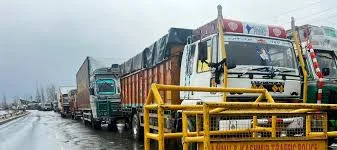M Haziq Pandit
Srinagar, Sept 03: As heavy rains continue to lash J&K, the weeklong closure of the Jammu-
Srinagar National Highway (NH-44) has severely disrupted the region's supply chain, leading to
a sharp rise in prices of vegetables, poultry, mutton, and other essentials across Srinagar.
The highway, the valley's only all-weather road linking it to the rest of the country, remains
blocked at multiple points due to landslides and shooting stones, halting the movement of trucks
carrying essential commodities and forcing residents to pay nearly double for basic necessities.
Residents across the city say both imported and locally grown vegetables are being sold at
exorbitant rates, making routine purchases a struggle. “Tomatoes that usually cost around Rs
50 per kilogram are now selling for Rs 80. Onions and potatoes are nearly double the usual
price,” said Ridha Iqbal, a resident of Rawalpora.
Muneer Wani, another resident from Batamaloo, added, “Even locally grown vegetables like
Collard greens (Haakh) now sell for Rs 80–100 per kilogram. Beans have risen to Rs 160, bitter
gourd and bottle gourd to Rs 100 each, and eggplant (brinjal) to Rs 90. Such steep increases
are really unfair to ordinary people.”
Fruits have also seen significant price hikes. “Apples and bananas are being sold at rates 30–40
per cent higher than usual,” said Wamiq Bhat, a resident of Nowgam.
The price surge is not limited to fruits and vegetables. Poultry rates have also jumped, with
chicken now selling at Rs 170 per kilogram in most areas and touching Rs 190 in some
markets, compared to the usual Rs 120–130. Egg prices have climbed sharply as well, with a
tray that cost Rs 170 earlier this week now going for Rs 220. “We are paying Rs 190 for
chicken, and that too of low quality. Egg rates have gone through the roof. This is exploitation in
the name of highway closure,” said Kashif Ahmad, a resident of Bagh-e-Mehtab.
Mutton, already considered a costly commodity for many, has also witnessed price surges,
reaching Rs 950 per kilogram in some markets. Interestingly, the ongoing marriage season has
further increased demand, making mutton scarce and pushing prices higher. “There is hardly
any stock available in the market. Whatever little comes is being diverted to marriages, as
dealers have prior commitments,” said Imran Parray, a mutton retailer in Rajbagh.
“We are unable to get fresh stock from other regions as trucks carrying livestock remain
stranded on the highway. What arrives is limited and expensive, forcing us to raise rates,”
added Showkat Qadri, another mutton retailer.
Residents are now urging authorities to step in and regulate rising prices. “We are already
struggling with high living costs, and the highway closure has made everything even more
expensive. Authorities must intervene with daily checks in all markets; otherwise, consumers will
continue to suffer,” said Sidiq Ahmad, a resident of Chanapora.
In response to these concerns, a senior official from the Legal Metrology Department,
requesting anonymity, stated, "Drives are already underway across the city to prevent hoarding
and black marketing." He, however, added that the department can only enforce the law on
packaged foods or products with MRP labels, unless the central government issues a
standardised rate list for non-packaged items like groceries.
Trade bodies have also urged restraint. Ajaz Shahdar, president of the Kashmir Trade Alliance,
warned shopkeepers against hoarding or price gouging. “We are monitoring markets closely
and have instructed traders to maintain stock and sell at fair rates. Hoarding or black marketing
will not be tolerated,” he said.
Meanwhile, Director of Food, Civil Supplies and Consumer Affairs (FCSCA) Kashmir, Dr Owais
Ahmad, assured the public that there is no shortage of essentials in the valley despite
disruptions caused by the highway closure. “We have sufficient stock available. People should
not panic,” he said.
Responding to complaints about overpricing, he added, “Strict monitoring is underway. We have
constituted special market-checking teams in all districts to prevent overpricing. While some
issues have arisen due to demand and supply pressure, the situation is being brought under
control. With supplies resuming, prices will stabilise.”
For now, residents are left coping with high prices and limited supplies, hoping the highway
reopens soon and markets return to normal.






